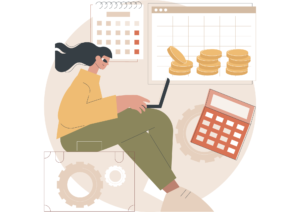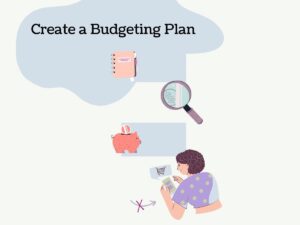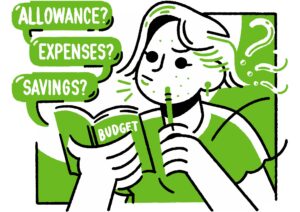Some of the links in this article may be affiliate links, which can provide compensation to us at no cost to you if you decide to purchase a recommended product or service. As an Amazon Associate I earn from qualifying purchases. I only recommend products I have personally used or experienced. Learn more on my privacy policy page.
Top 6 Ways to Start Budgeting your Money
Budgeting is a crucial element in achieving financial stability and success. It involves planning and managing finances to ensure that individuals can achieve their financial goals while also covering their essential expenses. By setting realistic goals, tracking expenses, prioritizing spending, creating a budgeting plan, saving for emergencies, and sticking to a budget, individuals can learn to take control of their finances and achieve long-term financial success. While budgeting can be challenging and require discipline and commitment, it is a necessary step in avoiding financial struggles, accumulating debt, and ensuring financial security for the future. In this essay, we will explore the importance of effective budgeting and provide an in-depth analysis of the top six ways to start budgeting your money.
HERE ARE THE TOP 6 WAYS TO START BUDGETING YOUR MONEY
-
Set Realistic Goals
-
Track Your Expenses
-
Prioritize Your Spending
-
Create a Budgeting Plan
-
Save for Emergencies
-
Stick to Your Budget
1. Set Realistic Goals
Setting financial goals is an essential first step in creating a budget. Your goals will give you a clear target to aim for and help you stay motivated. However, it is important to set goals that are realistic and achievable. When setting your goals, consider your current financial situation, income, and expenses. Decide what you want to achieve in the short term and long term. Your goals should be specific, measurable, achievable, relevant, and time-bound (SMART).
For example, a short-term goal might be to save $500 in three months, while a long-term goal might be to pay off your mortgage in 10 years. To achieve your goals, break them down into smaller milestones. This will help you track your progress and make adjustments along the way.

2. Track Your Expenses
Tracking your expenses is crucial in creating a budget. This involves recording all your income and expenses to get a clear understanding of where your money is going. To do this, you can use a spreadsheet, a notebook, or a budgeting app. Keep track of all your fixed expenses, such as rent or mortgage, utilities, and insurance, as well as variable expenses, such as groceries, entertainment, and transportation. It is important to record every expense, no matter how small.
Once you have tracked your expenses for a month or two, you can analyze your spending habits. Look for areas where you may be overspending, such as eating out or shopping. Identify expenses that you can reduce or eliminate to free up more money for savings or debt repayment.

3. Prioritize Your Spending
Prioritizing your spending is an important part of budgeting. This involves separating your expenses into two categories: essential and discretionary. Essential expenses are those that you need to pay to maintain your basic needs, such as food, housing, and utilities. Discretionary expenses are those that are not essential, such as dining out or traveling.
To prioritize your spending, start by listing your essential expenses and allocating a fixed amount of money for each category. Then, determine how much money you have left for discretionary spending. Set a limit for each category of discretionary expenses and stick to it. Prioritizing your spending will help ensure that you meet your basic needs while still allowing for some fun or entertainment.

4. Create a Budgeting Plan
Creating a budgeting plan is a critical step in managing your finances. Your plan should include a breakdown of your income, expenses, and financial goals. Start by calculating your total income, including your salary, side hustle, or any other sources of income. Then, subtract your fixed expenses, such as rent, utilities, and loan payments. The amount that is left is your discretionary income.
Next, create categories for your discretionary expenses, such as food, entertainment, and clothing. Allocate a fixed amount of money for each category, and stick to your budget as closely as possible. Use a budgeting app or spreadsheet to track your spending and adjust your budget as needed.

5. Save for Emergencies
Having an emergency fund is crucial for financial stability. An emergency fund is a savings account that is used for unexpected expenses, such as a car repair or medical bill. To build an emergency fund, set aside a small amount of money each month. Aim to save three to six months’ worth of living expenses.
It is important to keep your emergency fund separate from your other savings accounts, such as retirement or vacation funds. This will help you avoid dipping into your emergency fund for non-emergency expenses.

6. Stick to Your Budget
Sticking to your budget is one of the most crucial steps to achieving financial success. Budgeting allows you to keep track of your spending and make informed decisions about where your money is going. However, creating a budget is only the first step. Sticking to your budget requires discipline, commitment, and a willingness to make sacrifices in the short term for long-term financial gain.
One way to stick to your budget is to regularly track your expenses. This can help you identify areas where you are overspending and make adjustments to your budget as needed. Keeping a record of all your expenses, including both fixed and variable expenses, is essential to staying on track. You can use a spreadsheet, an app, or a notebook to keep track of your spending. The goal is to have a clear understanding of where your money is going.

In conclusion, budgeting is an essential skill that everyone should strive to learn and master. By setting realistic financial goals, tracking expenses, prioritizing spending, creating a budgeting plan, saving for emergencies, and sticking to a budget, individuals can take control of their finances and achieve their long-term financial aspirations. Effective budgeting can help individuals avoid financial struggles, reduce their debts, and attain financial stability and security. While the process may be challenging at first, with practice, discipline, and commitment, individuals can learn to develop good budgeting habits and achieve financial success. Ultimately, by adopting the top six ways to start budgeting your money, individuals can experience the peace of mind and satisfaction that comes with financial security and success.

